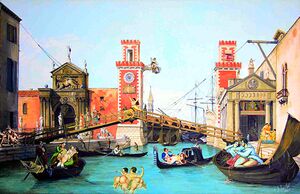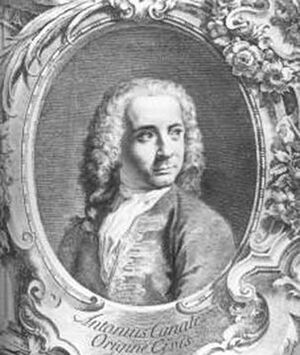Canaletto
“It was good for her ladyship's health to be thus painted by Canaletto enjoying her pleasures under the Rialto”
Giovanni Antonio Canal (1697 – 1768), known to historical posterity as Alfresco Canaletto, is best remembered for his paintings of people having 18th century frilly sex on boats, barges and rubber dinghies in the dying days of the Venetian Republic. The paintings became such a hit with Canaletto's English patrons, that the painter moved to Great Britain to continue his work in London. The English liked his work but were tardy payers so Canaletto returned him. He died in Italy in picturesque poverty, selling ice creams to tourists on a rented gondola. Only after his death was Canaletto's work fully appreciated. His name entered into the English language as the phrase 'go Alfresco Canaletto' to suggest lovers slipping out of their houses for vigorous nookie under the pale moonlight. It also inspired the Industrial Revolution as eager canal builders capitalised on the craze for outdoor sex to criss cross Great Britain with a network of artificial water ways. It was the era of Canal Sex, Casanova and the French Revolution.
Early Years[edit]
Canaletto showed early promise as a painter but many artists, he had a problem trying to get work or receiving a steady income. The usual patrons of Venice in that era were either the Catholic Church or the ruling families of Venice who ran the republic as a private company. If your face didn't fit, you got no commissions or money to pay for models to strip off for you in a studio. So Canaletto was forced to go outside and paint scenes in Venice around him to keep his paint brushes wet. It was whilst he was painting that he noticed that his fellow Venetians were slipping out of their houses to have it away which each other on the boats going up and down the canals. Canaletto discovered that adulterous behavior was was not outlawed on water and so taking advantage of this legal loophole (or oversight), Venetians of all sexes were doing the dirty. One of the prime practioners of this was the young Casanova and he was to write in his diaries of many a time he had 'tasted bowls of the forbidden fruit' whilst drifting up and down the Grand Canal with his stockings peeled off by accommodating young women.
Canaletto's quickness of brush and eagerness to fill a gap in the market, saw a rash of paintings of Venice during the annual carnival season or marking various celebrations in the calendar. Other artists sniffed at Canaletto's success and give him the name 'Alfresco Canaletto' (Canal Sex) for what they saw was vulgarity and pandering to baser desires. But Canaletto was untroubled and soon became a regular sight around the city, painting furiously away as he recorded the quivering backsides of Venice's boating elite.
English Tourists[edit]
It didn't take long for Canaletto's reputation to seep out of his home city like raw sewerage to attact the interest of outsiders. One group in particular became interested, the ruling class of Great Britain at the time who were represented by the dominant elite known as the Whigs. An indolent, self indulgent and sexually adventurous men (and some women too), the Whigs had long travelled to Italy for their 'Grand Tour', an upper class rite of passage that was meant to broaden their minds but often led to many of them picking up the vices of the age too. However there was perhaps a misunderstanding as the English misunderstood Canaletto's work. Requests for a bit of a 'canal action' and 'back passage invitations' were met by the artist inviting them upstairs in his Venetian studio to look at a wall of paintings. Perhaps to cover up their stupidity, the English aristocrats would apologise and say Of Course old chap. I meant your paintings. What else could I get talking about?. Casanova records one such incident in his diaries and marvelled at the British for their 'carnal circumlocutions when everyone knew what they were really in Venice for' but then added, but in Venice we know to make money out of confusion!'.
Other lazier or older English lords decided to pay for Canaletto to come over to London and see if he could recreate the debauchery they so much liked, on the river they knew so well. So Canaletto stayed and for the next few years became busy painting more sex on the river but this time in an English setting. However for the old maestro, the settings here never quite right and compared to the Italians, the English preferred their sex in their country houses or out the back with the servants. He did however stay for at least ten years which suggests that Canaletto was still able to 'paint the goods' on demand. But his heart was really in Venice and Canaletto was back there by 1760.
Final Years[edit]
Canaletto had hoped his work would gain him entry into the Venetian society he wanted to be so much apart. But tastes had changed, the Venetians had lost interest in their boat sex and were in now trying riskier tastes, inspired by that other 'son of Venice', Giacomo Casanova and his racy stories. It seems Canaletto finally left his brushes in the white spirit bottle and died not long after. So out of favour was Canaletto's work, that most of it was sold off to pay back taxes and vice bills.
Legacy[edit]
Following Canaletto's death, his ruder works were later destroyed, leaving art historians with a just a collection of pretty panoramic pictures with lots of boats and stick thin people moving around. What survives can be found in galleries or respectable country homes, expunging for good any remaining 'risque' reputation Canaletto's name was once such firmly attached.
| • • I T A L Y • • |
| Places |
| Rome • Venice • Florence • Bologna • Kingdom of the Two Sicilies • Pisa • Vatican City • Paneveggio • Grimsby • Portofino |
| People |
| • Canaletto • Dante • Botticelli • Mussolini • Berlusconi • da Vinci • Machiavelli • Michelangelo • Corleone • Vespucci • Boyardee • Raphael• Titian |
| Gastronomy |
| Pizza • Pasta • Alfredo • Spaghetti • Worms • Genitalia |

